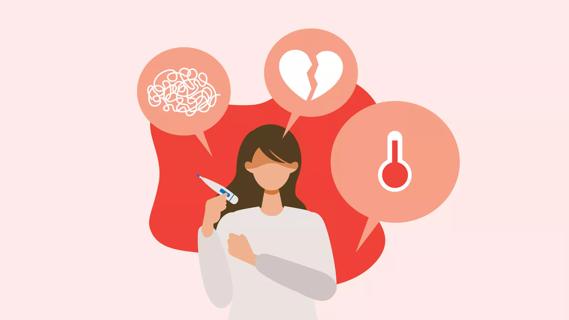A physical therapist says it boils down to two key things

We spend, on average, more than 10 hours of our day staring at screens, according to Nielsen, and many of us spend more than eight hours a day sitting at work. With all that sedentary time where we’re sitting in one position and looking down, it’s no wonder a recent study found that low back and neck pain is the third-largest cause of healthcare spending for Americans.
Cleveland Clinic is a non-profit academic medical center. Advertising on our site helps support our mission. We do not endorse non-Cleveland Clinic products or services. Policy
While some people experience neck pain or stiffness as the result of an injury or medical condition, for most people, it’s really the result of daily life, says physical therapist Chrindye Dietz, PT.
Looking down all day can cause the muscles around the neck joints to tire and become overstretched. “Once the area in the neck gets irritated, the muscles begin guarding and can put pressure on nerves that can radiate down into the shoulder blade, arm, hand and even up into the head and cause headache,” she says.
The easiest ways to prevent this from happening are to decrease the amount of stress you place on your spine and to keep your neck flexible.
Use your postural muscles – they’re there for a reason. Think of good posture as having your chest out, your head over your shoulders and your stomach tight, Ms. Dietz says.
You should maintain good posture throughout all of your daily activities, even if it takes more muscular and mental effort.
Below are some common ways our alignment gets out of whack throughout the day, and how to adjust.
The problem: Slouching in your chair results in more wear and tear on the spinal structures, Ms. Dietz says.
The fix: Your computer screen should be positioned at eye level, with your keyboard placed at elbow height so your arms make two 90 degree angles. Stack books under your monitor if you cannot create this position naturally with the equipment you have.
Sit back in your chair with your head back and chin in. Take breaks every hour or so to rest your neck. If you work on a laptop all day, use an external keyboard and mouse to achieve the best posture.
“The newest trend in many offices is changing the workstation to an adjustable sit-to-stand desk, which makes it even easier to move during the day,” Ms. Dietz says.
The problem: Continuously looking down for long periods of time without taking a break pulls your head forward and causes your spine to bear more weight.
The fix: If you’re going to be watching something lengthy on your phone or reading a book, hold or prop it up near eye level. If you’re in bed sitting against a headboard (the only way that Ms. Dietz recommends reading or watching a movie in bed), bend your knees and prop it there. Change your physical position and stretch in the opposite direction about every 20 minutes.
The problem: Sitting in a low seat that’s pushed too far back can make you drive with your head forward and chin up.
The fix: Position your seat up higher and level (not in a bucket position), and use a lumbar roll so that you can sit upright – not with your back rounded forward – with your head comfortably against the head rest. Adjust the steering wheel so that you can reach it comfortably while keeping your shoulders back. Tilt your rearview mirror slightly toward the roof so that an upright posture is necessary to maintain the field of vision in the mirror.
The problem: Sleeping with your spine out of alignment.
The fix: Lie with your spine in a neutral position, either on your back or side, using one pillow for your head. If you’re on your side, make sure your head is positioned so that you are looking straight ahead, not down at your feet. Your pillow should support your head and the curve of your neck, but not be under your shoulders. It may be helpful to use a contour pillow, or a rolled-up towel or cervical roll at the base of your normal pillow, to support the space between your head and shoulders.
Ms. Dietz recommends not sleeping on your stomach if you have a tight neck, as your head will be stretched in one direction all night.
“In my opinion, after 30, everyone needs to sit up straight and stretch every day,” she says. “For most people I recommend just stretching once a day at a stoplight or in the shower, and if it flares up then stretch a couple times a day for a few days until it loosens up.”
She recommends 5 to 10 reps of these stretches each day to prevent neck stiffness:
Learn more about our editorial process.

7 tips for choosing the best pillow to ease neck pain

Take matters into your own hands

An overactive immune system can be just as serious as one that stops working

The answer varies from person to person and vaccine to vaccine

Learn all you can, seek out support and don’t be afraid to advocate for yourself

From nausea, weight gain and eczema, stress can affect your immune system in many ways

This autoimmune disease can cause health issues ranging from mild to severe

Choose foods high in omega-3s and antioxidants; avoid red meat and dairy

Your metabolism may torch 1,300 to 2,000 calories daily with no activity

A gentle touch in all the right places may help drain your sinuses